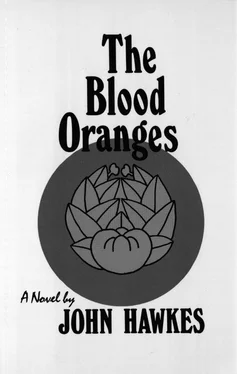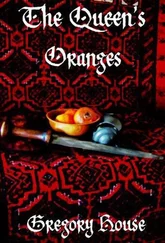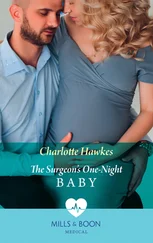“What happened?” I asked. “Are you all right?”
“I slipped, baby. Me! I went down about twenty steps.”
“Well,” I said, laughing, fumbling with the rucksack, finding the sweater, “let’s see if you can walk.”
“I hope you’re satisfied, Hugh,” Catherine said. “Fiona might have broken her ankle.”
“Climb into this sweater,” I murmured quickly and calmly, “and then we’ll check you out.”
But was she indeed hurt? Catherine was kneeling beside Fiona, Hugh was crouching, in his one hand gripped the now dying torch. Fiona herself was still prostrate on the cold stone. For a moment I had the decided impression that Hugh had bolted into these ruins and dragged us into these wet depths of vaulted darkness for the sole purpose of discovering nothing more than Fiona herself lying flat on her back in the faint eye of the torch like the remains of some lady saint stretched head to toe on her tomb. The expression on Fiona’s face seemed to bear me out, since her head was turned to the sound of my voice and since the slender construction of Fiona’s face and the willful eyes and thin half-smiling lips were raised to me in something more than mere personal concern for the immediate situation of unlikely accident. What else could that expression mean if not that she understood what I was thinking and was momentarily aware of her own body and expressly erotic temperament as the very objects of Hugh’s subterranean design? How else account for Fiona’s expression of puzzlement and appeal if not by knowing suddenly that Hugh was quite capable of attempting to transform my faunlike wife into a lifeless and sainted fixture in his mental museum?
“Give me your hand, baby. Help me up.”
But still no word from Hugh? No hint of his usually exaggerated concern for Fiona’s interests, pleasure, well-being, safety? Not even taking advantage of the darkness to thrust himself against Fiona who was now holding my hand and scrambling to her feet and was nothing if not responsive to Hugh’s slightest touch? But it was true, all too true. He must have known that today there would be no hugging and kissing, as Fiona had put it, long before Fiona had voiced that sad little conviction of hers, long before he had had his dream, long before he had banged his head on the rotted shutter.
There was nothing to do, I thought, except to hold wide the neck of the sweater and help Fiona, however clumsily, to pop her head through the opening and feel her way into the sleeves so absurdly long and tangling. And then, quite simply, I would demand the torch from Hugh and lead us calmly back up to the limitless pastel light of the burned court.
“As long as we’re here,” Fiona said then, “let’s look around.”
“OK,” I said, once more changing my mind, shifting my stance. “There’s nothing to see. But we’ll take a quick look anyway.”
I realized immediately that there was more to come, that Hugh had not yet shot his bolt of poison and that Fiona was not going to comply with my helpfulness and had already refused the possibility of wearing the sweater. But at least I managed to drape Hugh’s sweater across her shoulders and loop the long sleeves around her throat. In due time Hugh, not I, would lead us back up to the courtyard. Agreed.
“There’s no way out,” Hugh said. “We’re at the bottom.”
“Buried, you mean. Buried alive.”
To hear Catherine’s determined voice, to hear Hugh’s silence in response to it, to know that Fiona was once again looking for Hugh in the wet darkness, to be aware of this cold timeless space hollowed from the very roots of the sea — suddenly I wished again that Hugh’s poor torch would discover a real effigy with a stone cowl, stone feet, stone hands pressed together and pointed in prayer. Or would discover a real row of iron-headed pikes along one of the vaulted walls. Or a steel glove, the blade of an ax, a gold cup, anything to justify all this shadowy suspension of our lives of love. Surely this empty place should offer up some little crusty memento to justify my separation from sun and sea and grass, to justify the unspeakable content of Hugh’s dream. But then the memento, as it were, did in fact appear.
“Now, boy — how do you like it?”
“If I were you,” I said softly, slowly, “I’d leave that thing here where you found it. That’s my advice.”
“Leave it,” Catherine said quickly. “I don’t want to know what it is. I don’t want to see it.”
“Old Cyril knows what it is. Don’t you, boy?”
“Yes,” I murmured, “of course I do.”
“Tell us, baby. Tell us!”
“No, Fiona, it’s up to Hugh.”
“Damn right it is!”
And I who had never exposed Fiona to discomfort of any kind, I who had taken the exact same care of Catherine, I whose handsome and bespectacled face had always stood for sensuous rationality among the bright leaves, I the singer who spent my life quietly deciphering the crucial signs of sex, I who only moments before had decided that Hugh would discover nothing, nothing at all — now it was I, I alone, who shared with Hugh clear knowledge of the precise nature of what Hugh was dangling from the neck of the torch, as if I myself had sought it and found it and inflicted it on all four of us, silly and pathetic and yet monstrous memento of Hugh’s true attitude toward all of our well-intended loves.
“It’s a bad omen, Hugh,” I said. “Leave it behind.”
“My God, boy. Where’s your sense of humor?”
The voices echoed in the waxen blackness. Three figures squatted around Hugh’s pit, and Hugh himself stood waist-deep in this very pit which had emerged from beneath the beam of his torch only moments before. The cavern was empty, its wet walls and floor were empty, as I had thought. But the pit was not. Suddenly Hugh had found this small rectangular hole in the cavern floor and had leapt up to his knees in the refuse of coagulated fishing nets, broken clay pots and charred ribs of wood. In the midst of this pulpy refuse, he had poked with the torch itself until we heard the dull yet tinny sound of metal on metal, had thrust down the head of the torch and hooked what he was looking for and slowly, in rigid triumph, had raised the unmistakable object of his lonely search.
“I knew it was here. It had to be.”
“OK,” I murmured, “you found it. Now put it back.”
“Not a chance, boy not a chance …”
Then we were climbing, and in unchanged order (from top to bottom, from first to last), Hugh was perspiring in the lead, Fiona had obviously forgotten the effects of her fall and was pacing Hugh with renewed agility and fresh anticipation, Catherine was treading on Fiona’s heels, while I went chugging upward with my concentration divided between the gloom of the coming moment, as I envisioned it, and the pleasure of the daylight burning somewhere above our heads. Yes, I thought, Hugh’s exhibition in the courtyard was unavoidable. But after, after the silence, the disbelief, the dismay, perhaps then we would move on to long naked strokes in the bright sea or to a rendezvous of sorts with the small earthen-colored nightingale whose secret song I had recently heard not far from the villas. Or would the strains of this day dog us into the future, disrupt our embraces, diminish the peaceful intensity of all those simple idyls I still had in mind?
We stopped, we slipped, we climbed on.
“Thank God, baby. We’re safe!”
Fiona with the empty sweater clinging to her back like the cast-off skin of some long-forgotten lover, Catherine with her eyes tight shut and hair awry and broad cheeks brightly skimmed with tears, I shading my face and easing off the uncomfortable and partially opened rucksack, Hugh holding aloft his prize and leaping through the weeds to a fallen pediment, Hugh turning and facing us with the little copper rivets dancing on his penitential denims and his mouth torn open comically, painfully, as if by an invisible hand — suddenly the four of us were there, separated, disheveled, blinking, and yet reunited in this overgrown and empty quadrangle that now was filled with hard light and the sweet and salty scent of endless day. I dropped the rucksack, squinted, fished for a fat cigarette. Fiona caught hold of the sleeves of the sweater at the wrists and pulled the long empty sleeves wide and high in a gesture meant only for the far-off sun. Catherine sat on a small white chunk of stone and held her head in her hands, Hugh tipped his prize onto the altar of the fallen pediment and flung aside the torch, reared back, and waited.
Читать дальше












